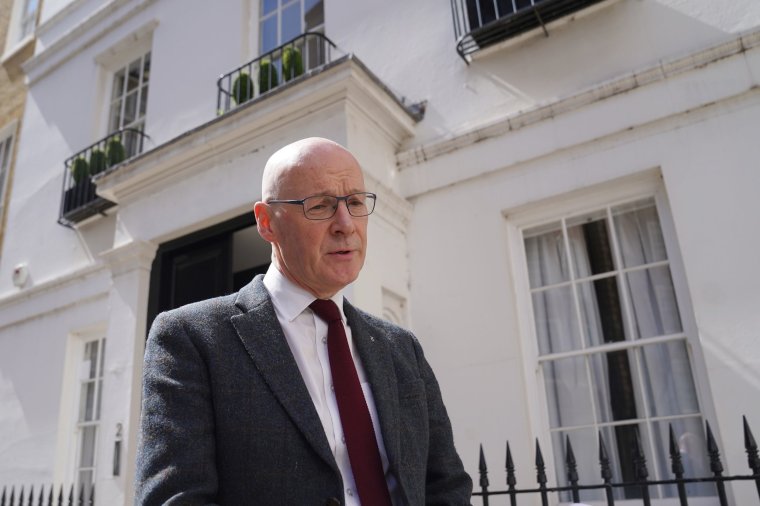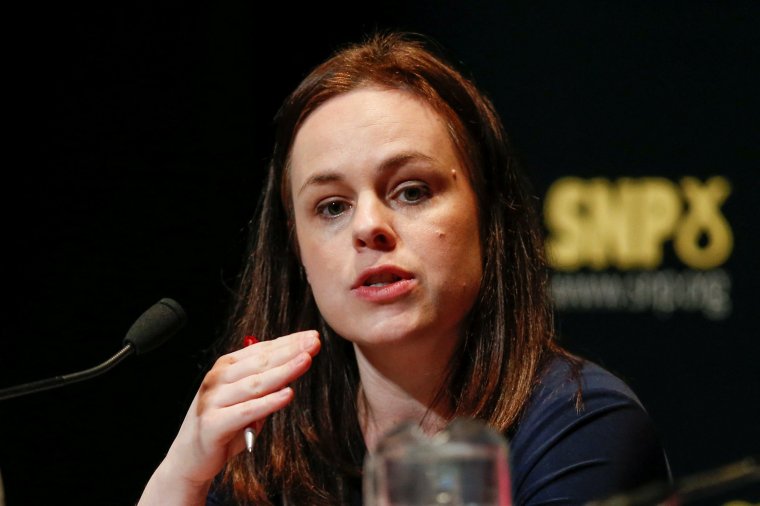A furious battle to lead the SNP and the Scottish Government is now under way after Humza Yousaf announced he would soon step down as First Minister.
Former SNP leader John Swinney and former leadership contestant Kate Forbes have emerged as the frontrunners to succeed Mr Yousaf, with bitter internal divisions laid bare by his dramatic exit.
Allies of Ms Forbes told i they would oppose a “coronation” of Mr Swinney, after a group of senior SNP figures rallied round the party veteran as the main “anyone but Kate” candidate.
Pollsters said the SNP’s implosion meant another independence referendum was “not on the table anytime soon” but that leadership candidates would not be able to shy away from the issue in a contest.
Fighting back tears at a hastily-assembled press conference on Monday, Mr Yousaf admitted that he “underestimated” the hurt of the Scottish Greens after he tore up a power-sharing deal with the smaller party four days ago.
The collapse of the agreement backfired and saw Mr Yousaf facing two votes of no confidence later this week, as the Greens made clear that they would join opposition parties in trying to force him out.
An arrangement with Alex Salmond’s breakaway nationalist Alba Party was unpalatable to many within the SNP, and Mr Yousaf said he was not willing to “do deals with whomever simply for retaining power”.
Mr Swinney said on Monday that he was giving “very careful consideration” to taking on the role, having been “somewhat overwhelmed” by messages from colleagues.
Education Secretary Jenny Gilruth, touted as one of the top “continuity” leadership contenders, made way for Mr Swinney, saying on X that he was “the best choice to be Scotland’s First Minister”.
Stephen Flynn, the SNP’s Westminster leader, threw his weight behind Mr Swinney to become leader. And another contender, Scotland’s Health Secretary Neil Gray, was also thought to be encouraging Mr Swinney to run.

i understands that senior SNP figures around Mr Yousaf – including minister Angus Robertson and Deputy First Minister Shona Robison – first urged Mr Swinney to run when it became clear over the weekend that the current leader could not carry on.
They are not convinced that Ms Gilruth or anyone else in the cabinet has the experience or standing to take on Ms Forbes – a Free Church of Scotland Christian with socially conservative views who ran Mr Yousaf close last year. She won 48 per cent of the membership’s vote to Mr Yousaf’s 52 per cent at the final stage in the leadership battle.
Her allies are furious that an SNP “old guard” is organising on behalf of Mr Swinney, who led the party between 2000 and 2004.
Senior MSP Fergus Ewing said he expected Ms Forbes to stand, saying she would offer “a change in approach, a fresh start – not another continuity candidate”.
An SNP source, who is a backer of Ms Forbes, argued that she would allow the party to make a decisive break with the past. “Swinney is part of the problem, not the solution,” they said, warning against any “coronation” by the party establishment.
Another Forbes supporter added: “She is the outstanding candidate. It’s been a mess. She would be the one to draw a line under the mess we’ve got into under Humza Yousaf.”
But Scottish Conservatives leader Douglas Ross claimed that Mr Swinney would represent “absolute continuity” as SNP leader. He told Times Radio that he “wouldn’t be surprised if John Swinney has this sewn up already”.
i understands that Mr Ross’s party would consider working with Ms Forbes on certain issues if the focus on Scottish independence was put aside – though the Tories see it as an unlikely prospect.

Alex Salmond’s Alba Party, though aligned with Ms Forbes on gender politics and other social issues, warned all candidates that they would have to recommit to an independence referendum to win the support of its MSP Ash Regan.
Alba’s general secretary Chris McEleny told i: “Anyone putting themselves forward as SNP leader that would rule out independence in the near future would not do well.”
James Mitchell, Edinburgh University’s professor of public policy, said there was “anger and bitterness inside the party” and the leadership battle would likely make the SNP’s poll fortunes worse.
He said the push for Mr Swinney was a “sign of desperation” and was only happening because the party had “got itself in an even worse mess” over the past year.
Prof Mitchell added: “Independence is not on the table anytime soon. The candidates will all have to talk up independence, but none of them have a plan to resolve the impasse. There are a whole series of issues and questions that the SNP has never provided a coherent answer to.”
Mr Salmond claimed that Mr Yousaf had made positive overtures to his Alba Party about working together – but “forces within” the SNP stopped Mr Yousaf from striking any agreement.
“At half past seven this morning he was trying to do a deal with Alba and complimented the proposals we made as ‘very reasonable,'” the former First Minister told the BBC.
Mr Yousaf said he would remain First Minister until his successor was chosen. Urging opposition parties to “collaborate” with the SNP, Mr Yousaf stressed: “I bear no ill will, and certainly bear no grudge against anyone. Politics can be a brutal business.”
The Scottish Greens co-leader, Lorna Slater, said Mr Yousaf’s exit was the inevitable “fall-out” from his decision to ditch her party last week. But she said there was now “no point” in the votes of no confidence put forward by Labour and the Tories.
Scottish Labour leader Anas Sarwar said he would see how the week “plays out” before deciding if a no confidence motion was still worth pushing. He attacked the “dysfunctional” SNP and “chaotic government” as he repeated his call for a fresh Holyrood election.
Analysis: The SNP’s uphill struggle
The SNP faces an uphill struggle to revive its flagging fortunes in the polls after the dramatic exit of Humza Yousaf as First Minister.
The party has been thrown into a fresh round of feuding after Mr Yousaf’s gamble in ditching the Scottish Greens to go it alone in a minority government backfired in spectacular fashion.
Public arguments brought on by a leadership contest would appear to set back the SNP’s immediate hopes of clinging on to most of their 43 seats in Scotland at the general election.
The gloom surrounding the SNP presents a huge opportunity for Labour to become the biggest party north of the border once again – at least when it comes to the Westminster constituency map – and boosts Keir Starmer’s chances of winning a thumping majority.
It would also appear to set back the Scottish independence cause. The movement has been stuck in a strategic impasse even since the Supreme Court’s dismissal of the bid to hold a second referendum.
Though the SNP built support for independence even after losing the 2014 referendum, and moved from one charismatic leader to another under Alex Salmond and Nicola Sturgeon, Mr Yousaf’s time in charge ended the momentum behind the push for another say.
However, polls show that Scottish voters have been firmly deadlocked on the independence question for several years.
With roughly half the country persuaded by the case for separation, it represents a strong base for the SNP to spring back from – should a new leader manage to draw a line under current woes after the general election.



'President Musk' is flexing his muscles and revealing how weak Trump is